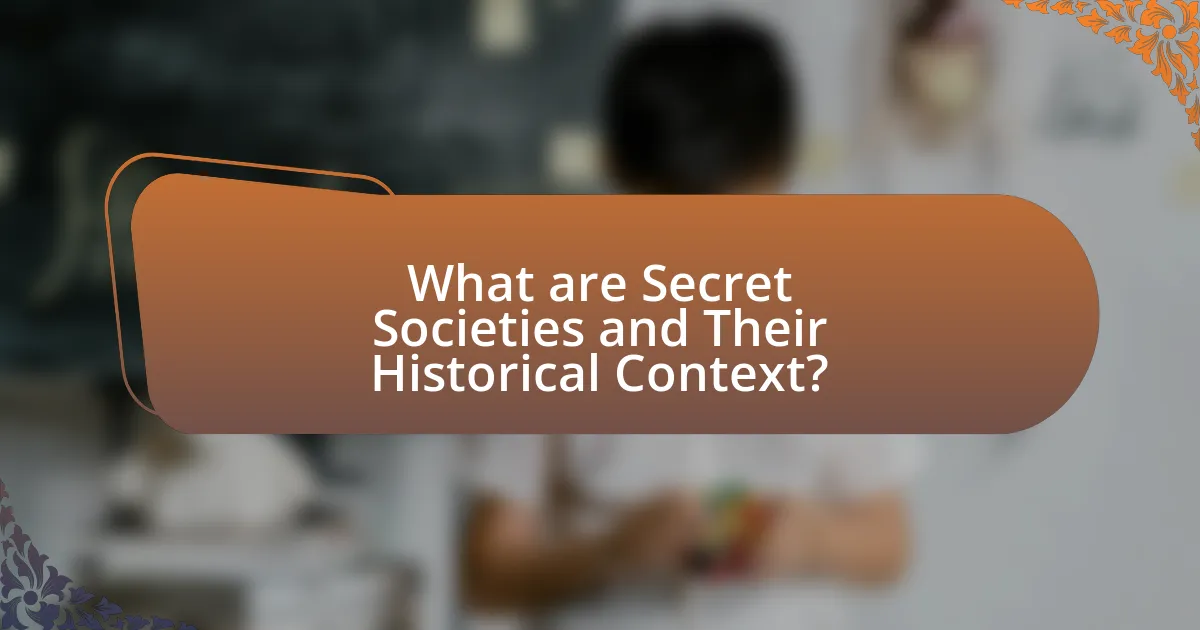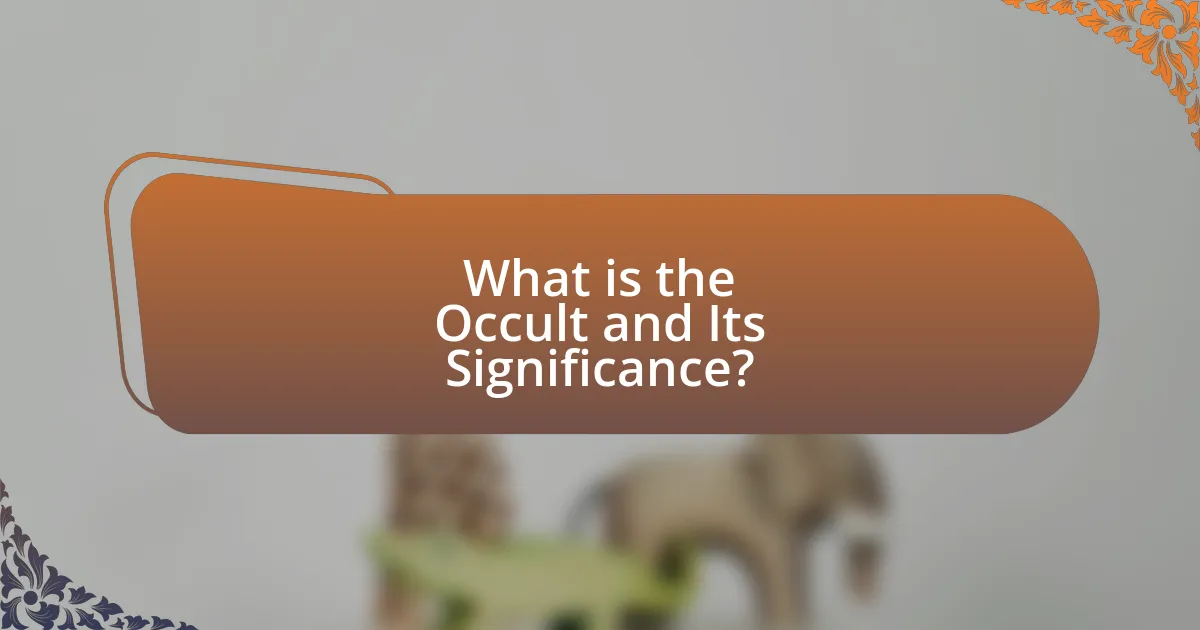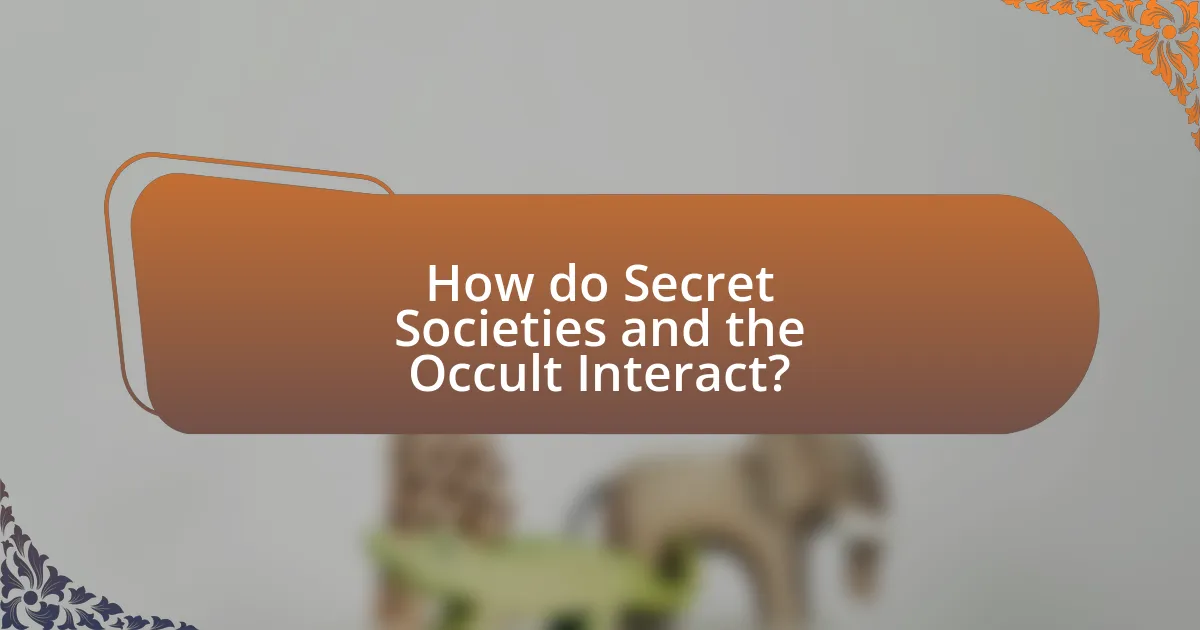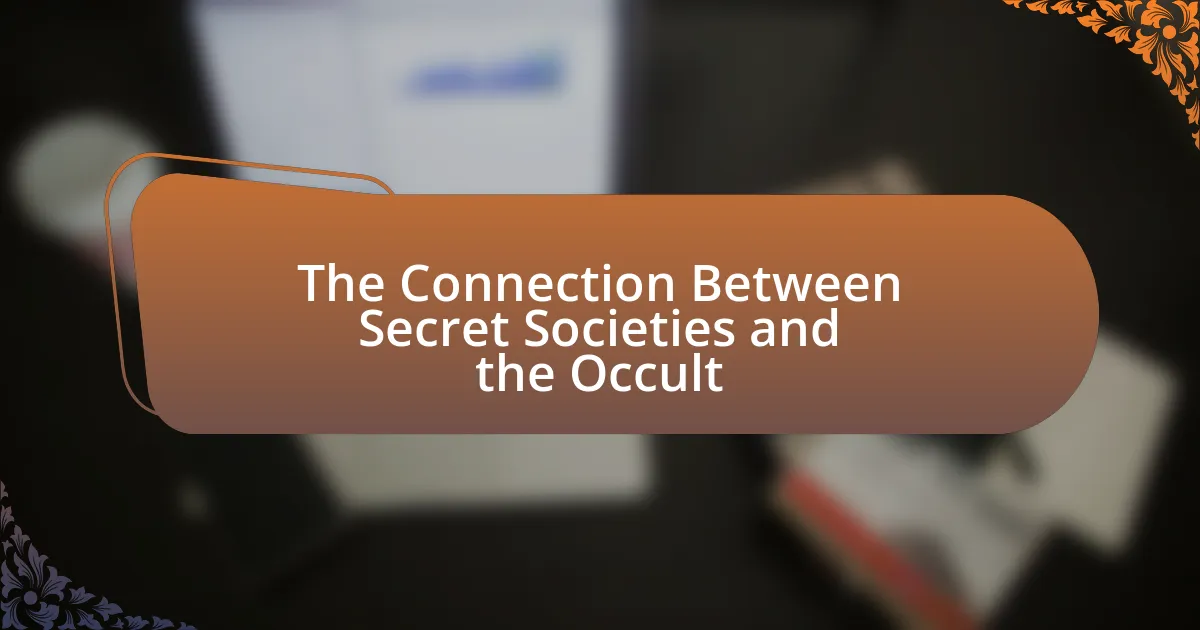The article explores the intricate relationship between secret societies and the occult, defining secret societies as clandestine organizations with exclusive memberships and hidden agendas that have historically influenced social, political, and religious movements. It examines the evolution of these societies from ancient guilds to modern organizations, highlighting notable examples such as the Freemasons and the Illuminati, and their roles in shaping societal norms and governance. Additionally, the article discusses the significance of occult practices within these societies, including their rituals and beliefs, and how historical events have driven the formation and influence of both secret societies and occult traditions. The implications of this connection on public perception, societal structures, and individual motivations are also analyzed, providing insights into the complex dynamics of secrecy and belief systems.

What are Secret Societies and Their Historical Context?
Secret societies are organizations that operate in secrecy, often with exclusive membership and hidden agendas, historically linked to various social, political, and religious movements. These societies, such as the Freemasons and the Illuminati, emerged during periods of social upheaval, like the Enlightenment and the French Revolution, where they sought to influence political power and promote specific ideologies. For instance, the Freemasons, founded in the late 16th to early 17th century, aimed to foster moral and ethical development among its members while often being accused of wielding significant political influence. The historical context of secret societies reveals their role in shaping societal norms and challenging established authorities, often intertwining with occult practices and esoteric knowledge, as seen in the rituals and symbols they employ.
How have secret societies evolved over time?
Secret societies have evolved from ancient guilds and religious orders into modern organizations with diverse purposes, often shrouded in secrecy. Initially, these societies, such as the Eleusinian Mysteries in ancient Greece, focused on spiritual enlightenment and community bonding. Over time, particularly during the Enlightenment, secret societies like the Freemasons emerged, emphasizing philosophical ideals and social reform, which reflected broader societal changes. In the 19th and 20th centuries, the rise of occultism led to the formation of groups like the Hermetic Order of the Golden Dawn, which blended mysticism with esoteric knowledge. This evolution illustrates a shift from purely social or spiritual objectives to a complex interplay of secrecy, power, and the exploration of the unknown, influenced by historical contexts and cultural shifts.
What are the origins of notable secret societies?
Notable secret societies originated primarily in the late medieval and early modern periods, often as a response to social, political, and religious upheaval. For example, the Freemasons, founded in the early 18th century, emerged from the guilds of stonemasons and became a vehicle for Enlightenment ideals, promoting reason and fraternity. The Illuminati, established in 1776 in Bavaria, aimed to promote secularism and rational thought against religious and political oppression. The Rosicrucians, originating in the early 17th century, combined elements of mysticism, alchemy, and esoteric knowledge, reflecting the period’s fascination with the occult. These societies often sought to provide a sense of community and shared purpose among their members, while also engaging in practices that were considered subversive or controversial by mainstream society.
How do historical events influence the formation of secret societies?
Historical events significantly influence the formation of secret societies by creating environments of social unrest, political upheaval, or cultural shifts that drive individuals to seek alternative forms of organization and community. For instance, the Enlightenment period, marked by a questioning of traditional authority and the rise of individualism, led to the establishment of societies like the Freemasons, which promoted ideals of knowledge and fraternity in response to oppressive regimes. Similarly, the aftermath of the French Revolution saw the emergence of various secret societies that aimed to protect revolutionary ideals and counteract perceived threats from monarchies. These historical contexts provide the impetus for individuals to form clandestine groups that often embody the values or resistances relevant to their times, thus illustrating the direct correlation between historical events and the emergence of secret societies.
What roles do secret societies play in society?
Secret societies play various roles in society, including fostering community among members, influencing political and social structures, and preserving esoteric knowledge. Historically, organizations like the Freemasons and the Rosicrucians have provided a network for individuals to connect and share ideas, often promoting values such as charity and moral development. Additionally, secret societies have been implicated in shaping political decisions and societal norms, as seen in the influence of groups like the Skull and Bones at Yale University, which has produced numerous political leaders. Furthermore, these societies often engage in the preservation and transmission of occult knowledge, as evidenced by the rituals and teachings that are kept confidential among members, contributing to a sense of mystery and exclusivity.
How do secret societies influence politics and governance?
Secret societies influence politics and governance by operating behind the scenes to shape decision-making and policy through networking, shared ideologies, and strategic alliances. Historical examples include the Freemasons, who have been linked to significant political events such as the American Revolution, where members played key roles in advocating for independence and establishing governance structures. Additionally, the Skull and Bones society at Yale has been associated with influential political figures, including several U.S. presidents, suggesting that these groups can facilitate access to power and resources, thereby impacting political outcomes.
What social functions do secret societies serve?
Secret societies serve various social functions, including fostering community, providing a sense of belonging, and facilitating networking among members. These organizations often create exclusive environments where individuals can share common interests, beliefs, or goals, which enhances social cohesion. For instance, historical examples like the Freemasons have been known to promote charitable activities and mutual support among members, reinforcing social bonds. Additionally, secret societies can serve as platforms for political influence and social change, as seen in groups like the Illuminati, which aimed to promote Enlightenment ideals. Such functions illustrate how secret societies contribute to social structures and dynamics within communities.

What is the Occult and Its Significance?
The occult refers to knowledge and practices that are hidden or esoteric, often involving supernatural or mystical elements. Its significance lies in its influence on various cultural, spiritual, and philosophical movements throughout history, including secret societies that utilize occult symbols and rituals to convey deeper meanings and foster a sense of community among members. For example, the Freemasons incorporate occult symbolism in their rituals, which serve to impart moral lessons and promote personal development. The study of the occult has also been linked to the exploration of consciousness and the quest for understanding the unknown, as seen in the works of figures like Aleister Crowley, who sought to integrate occult practices into modern spirituality.
How is the occult defined in various cultures?
The occult is defined as knowledge of the hidden or the supernatural across various cultures, often associated with mystical practices and esoteric traditions. In Western cultures, it typically encompasses practices such as alchemy, astrology, and magic, often linked to secret societies like the Freemasons and Rosicrucians, which historically sought hidden truths about the universe. In Eastern cultures, such as in Hinduism and Buddhism, the occult may refer to spiritual practices that involve meditation, rituals, and the exploration of consciousness, emphasizing the connection between the material and spiritual realms. Additionally, African and Indigenous cultures often view the occult as a means to connect with ancestors and spirits, utilizing rituals and divination to gain insight and guidance. These definitions highlight the diverse interpretations of the occult, reflecting cultural beliefs and practices surrounding the unseen and the mystical.
What are the key beliefs and practices associated with the occult?
The key beliefs associated with the occult include the existence of hidden knowledge, the influence of supernatural forces, and the pursuit of personal transformation through esoteric practices. Practitioners often believe in the interconnectedness of all things and the ability to manipulate energies for personal or spiritual gain. Common practices include ritual magic, divination, astrology, and the study of alchemy. Historical evidence shows that these beliefs and practices have roots in various ancient traditions, such as Hermeticism and Gnosticism, which emphasize the quest for enlightenment and the understanding of the universe’s mysteries.
How does the occult differ from mainstream religions?
The occult differs from mainstream religions primarily in its focus on esoteric knowledge and practices that are often hidden or secretive. While mainstream religions typically emphasize communal worship, established doctrines, and moral guidelines, the occult involves personal exploration of mystical experiences, rituals, and beliefs that may not be widely accepted or understood by the general public. For example, occult practices may include astrology, alchemy, and divination, which are often viewed with skepticism by mainstream religious institutions. This distinction highlights the occult’s emphasis on individual spiritual journeys and alternative belief systems, contrasting with the structured frameworks of mainstream religions.
What historical connections exist between the occult and secret societies?
Historical connections between the occult and secret societies are evident in the practices and beliefs shared by both entities, particularly during the Renaissance and Enlightenment periods. Secret societies such as the Rosicrucians and Freemasons incorporated esoteric knowledge, mystical rituals, and symbolic language that are hallmarks of occult traditions. For instance, the Rosicrucian manifestos of the early 17th century promoted a blend of alchemy, mysticism, and spiritual enlightenment, reflecting the occult’s influence on their teachings. Similarly, Freemasonry, which emerged in the late 16th to early 17th centuries, adopted various occult symbols and rituals, emphasizing personal transformation and the pursuit of hidden knowledge. These connections illustrate how secret societies have historically served as vehicles for the dissemination and practice of occult beliefs, intertwining their legacies throughout history.
How have secret societies incorporated occult practices?
Secret societies have incorporated occult practices through rituals, symbolism, and esoteric knowledge aimed at achieving spiritual enlightenment or power. For instance, organizations like the Freemasons utilize symbols such as the square and compass, which have occult significance, to convey deeper philosophical meanings. Additionally, the Rosicrucians blend alchemical and mystical traditions, emphasizing personal transformation through secret teachings. Historical evidence shows that many secret societies, including the Hermetic Order of the Golden Dawn, engaged in ceremonial magic and the study of ancient texts, further intertwining their practices with occultism.
What are some examples of secret societies with occult affiliations?
Examples of secret societies with occult affiliations include the Freemasons, the Rosicrucians, and the Hermetic Order of the Golden Dawn. The Freemasons, established in the late 16th to early 17th century, incorporate esoteric rituals and symbols believed to have mystical significance. The Rosicrucians, originating in the early 17th century, focus on spiritual enlightenment and the study of alchemy, mysticism, and the occult. The Hermetic Order of the Golden Dawn, founded in the late 19th century, is known for its teachings on magic, astrology, and Kabbalah, emphasizing the pursuit of personal transformation through occult practices.

How do Secret Societies and the Occult Interact?
Secret societies and the occult interact through shared beliefs, rituals, and secrecy, often intertwining their practices and philosophies. Many secret societies, such as the Freemasons and the Rosicrucians, incorporate occult elements like esoteric knowledge, symbolism, and mystical rituals into their traditions. Historical evidence shows that these societies have drawn from occult practices to enhance their spiritual and philosophical frameworks, as seen in the use of alchemical symbols and Kabbalistic teachings. This interaction fosters a unique environment where members explore hidden knowledge and spiritual enlightenment, reinforcing the connection between the two realms.
What are the motivations behind the connection between secret societies and the occult?
The motivations behind the connection between secret societies and the occult primarily stem from a desire for esoteric knowledge and power. Secret societies often seek to explore hidden truths and spiritual insights that are not accessible to the general public, believing that such knowledge can provide them with advantages in various aspects of life, including social, political, and economic realms. Historical examples, such as the Freemasons and the Rosicrucians, illustrate this pursuit, as they incorporated occult practices and symbols into their rituals to foster a sense of exclusivity and deeper understanding of the universe. This connection is further reinforced by the belief that engaging with the occult can lead to personal transformation and enlightenment, which are central tenets in many secret societies.
How do secrecy and ritual enhance the appeal of the occult within secret societies?
Secrecy and ritual significantly enhance the appeal of the occult within secret societies by creating an aura of mystery and exclusivity. This allure stems from the human fascination with the unknown and the desire to belong to an elite group that possesses hidden knowledge. Historical examples, such as the Freemasons and the Rosicrucians, illustrate how their secretive practices and elaborate rituals foster a sense of identity and purpose among members, making the occult more enticing. The rituals often involve symbolic acts that reinforce the group’s beliefs and values, further deepening the members’ commitment and connection to the occult. This combination of secrecy and ritual not only attracts individuals seeking deeper spiritual experiences but also solidifies the group’s cohesion and mystique, making the occult a compelling aspect of secret societies.
What psychological factors contribute to the allure of this connection?
The psychological factors contributing to the allure of the connection between secret societies and the occult include a desire for belonging, the appeal of mystery, and the quest for power. Individuals often seek affiliation with secret societies to fulfill their need for social connection and identity, as these groups provide a sense of community and exclusivity. The allure of mystery captivates the imagination, as the hidden knowledge and rituals associated with the occult create an enticing narrative that draws individuals in. Additionally, the pursuit of power and influence is a significant motivator; members may believe that access to esoteric knowledge can enhance their status or control over their environment. Research indicates that the human brain is wired to respond positively to social bonds and the thrill of the unknown, reinforcing the attraction to these clandestine groups.
What are the implications of the connection between secret societies and the occult?
The connection between secret societies and the occult implies a significant influence on societal structures and cultural beliefs. Secret societies often engage in esoteric practices and rituals that can shape their members’ worldviews and decision-making processes. For instance, historical examples such as the Freemasons and the Rosicrucians illustrate how these organizations have incorporated occult knowledge to foster a sense of exclusivity and power among their members. This connection can lead to the perpetuation of secrecy, manipulation of social norms, and the establishment of alternative power dynamics that challenge mainstream societal values. The implications extend to potential societal divisions, as the beliefs and practices of these groups may conflict with established religious and moral frameworks, thereby influencing broader cultural narratives and political agendas.
How does this connection affect public perception of secret societies?
The connection between secret societies and the occult significantly influences public perception by fostering suspicion and intrigue. This association often leads individuals to view secret societies as enigmatic and potentially malevolent organizations, primarily due to historical events such as the public’s reaction to the Freemasons in the 18th century, where conspiracy theories emerged linking them to occult practices. Additionally, media portrayals, such as in films and literature, frequently depict secret societies as involved in dark rituals, further entrenching the belief that these groups operate outside societal norms. Consequently, this perception can result in a general mistrust of such organizations, as people often associate them with hidden agendas and a lack of transparency.
What risks and benefits arise from the intersection of these two entities?
The intersection of secret societies and the occult presents both risks and benefits. The primary risk involves the potential for manipulation and exploitation, as secret societies may leverage occult practices to exert control over individuals or groups, leading to psychological harm or societal disruption. For instance, historical examples like the use of occult rituals in certain secretive organizations have raised concerns about coercive influence and unethical behavior.
Conversely, a benefit of this intersection can be the fostering of community and shared beliefs among members, which can provide a sense of belonging and purpose. Some secret societies promote personal development and esoteric knowledge, potentially leading to enhanced spiritual awareness and personal growth for their members. This duality illustrates the complex nature of their relationship, where the same practices can lead to both empowerment and exploitation.
What practical insights can be drawn from the connection between secret societies and the occult?
The connection between secret societies and the occult reveals practical insights into the use of symbolism and ritual for social cohesion and influence. Secret societies often employ occult practices to create a sense of exclusivity and shared identity among members, which can enhance loyalty and commitment. For instance, the Freemasons utilize symbols and rituals that convey moral lessons and foster a strong community bond, demonstrating how these elements can be strategically employed to maintain group solidarity. Additionally, historical examples, such as the Rosicrucians in the 17th century, illustrate how occult knowledge was used to challenge established norms and promote new philosophical ideas, thereby influencing societal change. This connection underscores the potential of secret societies to leverage occult practices as tools for both personal development and broader social impact.
How can understanding this connection inform modern societal views on secrecy and belief systems?
Understanding the connection between secret societies and the occult can inform modern societal views on secrecy and belief systems by highlighting how hidden knowledge and exclusive practices shape cultural narratives and influence power dynamics. This relationship illustrates that secrecy often serves as a mechanism for maintaining control and fostering a sense of belonging among members, which can lead to the reinforcement of specific belief systems. Historical examples, such as the Freemasons and their rituals, demonstrate how secrecy can create an aura of mystique that attracts individuals seeking deeper meaning or community, thereby impacting societal perceptions of both secrecy and belief. Furthermore, studies indicate that societies with a strong emphasis on secrecy may develop unique belief systems that diverge from mainstream ideologies, as seen in various religious and philosophical movements throughout history.
What lessons can be learned from historical interactions between secret societies and the occult?
Historical interactions between secret societies and the occult reveal lessons about the influence of esoteric beliefs on social and political structures. These interactions often demonstrate how secret societies, such as the Freemasons and the Rosicrucians, utilized occult knowledge to establish networks of power and influence, shaping cultural and intellectual movements. For instance, the Enlightenment period saw the rise of secret societies that incorporated occult philosophies, which contributed to revolutionary ideas about governance and individual rights. Additionally, the rituals and symbols used by these societies often served to create a sense of identity and exclusivity, reinforcing their members’ commitment to shared beliefs. This historical context illustrates the significant role that occult practices played in the formation and operation of influential groups, highlighting the interplay between secrecy, knowledge, and power throughout history.
